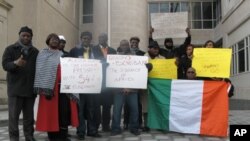While African regional bodies are taking the lead in trying to convince incumbent Ivory Coast President Laurent Gbagbo to step down, the U.S. government has also made repeated and forceful statements against the resistant leader. This approach has gotten mixed reviews, and brought warnings it could lead to the breakup of Ivory Coast.
At a recent protest at the Ivory Coast embassy in Washington, Coffi Sosthene was one of a dozen protesters supporting the actions of President Barack Obama's administration, calling for Mr. Gbagbo to give way to Alassane Ouattara, the man whose election as president is recognized by the United Nations, the African Union and West Africa's regional bloc, ECOWAS.
"I think the Obama administration responded at the right time in the beginning of the whole scenario which is very good, and the United States for once has been on the right side, the United States is on the side of the president elected by the people. The Ivorian people will never forget this," he said.
Sosthene is a U.S. representative of the Ivorian political party for former President Henri Konan Bedie who finished third in the first round of the highly contested Ivorian election and then supported Mr. Ouattara in the November 28 runoff.
The United Nations and the United States say Mr. Ouattara won the election, as counted by the national election commission. But this result was overturned by the Ivorian constitutional council which threw out votes from the country's rebel-held north and gave victory to Mr. Gbagbo.
U.S.-based anthropologist and West Africa expert Stephen Smith says upholding democratic results is crucial to Mr. Obama's Africa policy.
"I understand from the conversations I had with American officials that President Obama took it as a personal slight that in the country neighboring the place where he spoke out for democracy, on his first trip to Africa in neighboring Ghana, he spoke out for democracy and for the need for Africans to take into their hands their destiny. And he sees this blatant violation of democratic principles, shredding to pieces electoral results, proclaiming a fantastical result, something that he cannot put up with," he said.
U.S. officials have repeatedly said Mr. Gbagbo must go. They also announced sanctions against Mr. Gbagbo, his family and key members of his government.
Mr. Gbagbo has responded by saying the United States is part of a foreign conspiracy against his country's independence. He has refused to speak or have meetings with American officials.
This week, State Department officials said they were still ready to help arrange what they called "a dignified exit" for Mr. Gbagbo, but that this window of opportunity was quickly closing.
A pro-Gbagbo Ivorian political analyst Gervais Gnaka says he believes foreigners often misunderstand the historical context of African countries. "What President Obama should know and what all the people who are talking about Laurent Gbagbo, even though Laurent Gbagbo is an imperfect person, and he made many mistakes but he is the symbol of the resistance of many millions of Ivorians and many Africans, and when you can see people in Congo, in Gabon, in Cameroon, gathering and mobilizing to support Laurent Gbagbo it is not because Laurent Gbagbo is an angel but it is because people are tired of the interference of the west in African domestic affairs," he said.
U.S.-based Africa analyst J. Peter Pham says he never believed an election would reunite Ivory Coast, which remains split between the Gbagbo-run south and the rebel-held north. Mr. Ouattara has been able to convince international banks to freeze Ivorian accounts, but in the main southern city Abidjan, the internationally-recognized president remains holed up in a luxurious hotel, protected by former rebels and U.N. peacekeepers.
Pham is currently writing a book about Ivory Coast. "The problem in Cote d'Ivoire, Ivory Coast, was that people were driving toward an election as if that would solve the problem and I have long held the position there are some root causes to the conflict that existed before (Mr.) Gbagbo was even president and certainly will exist after he is off the scene and unless those are addressed you are going to have a society that is essentially divided down the middle," he said.
These include creating a unified army between northerners and southerners, establishing clear land rights in volatile cocoa-rich areas and general acceptance of Mr. Ouattara as an Ivorian. Mr. Ouattara, a former prime minister, had been excluded from previous polls over doubts concerning his nationality.
Key rebel demands, which were granted in successive internationally-brokered peace deals, were to give Mr. Ouattara the right to run in the latest election and for hundreds of thousands of descendants of migrant workers from neighboring countries the right to become Ivorian and vote.
Pham warns that if world powers like the United States do not move beyond what he calls posturing, and just wanting Mr. Ouattara to be installed as president, to helping find a more sustainable settlement, he warns the result could be heightened violence and eventually the breakup of Ivory Coast.
US Stance on Ivory Coast Gets Mixed Reviews












